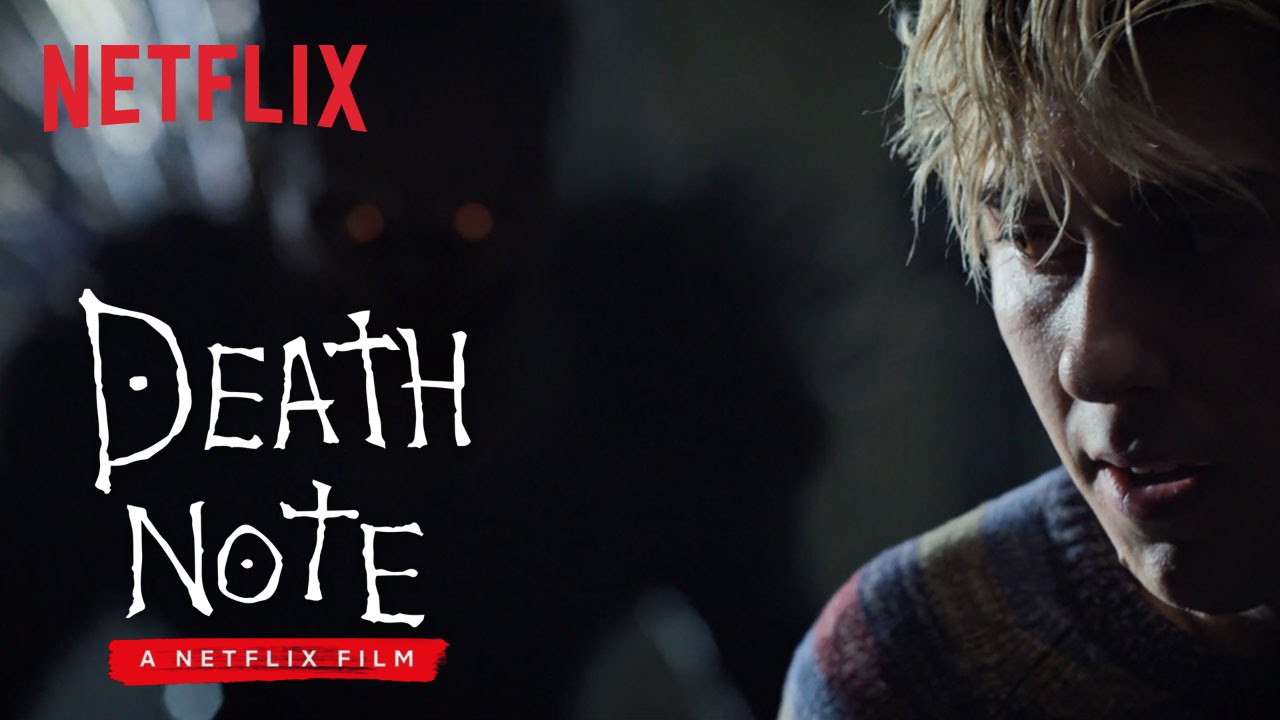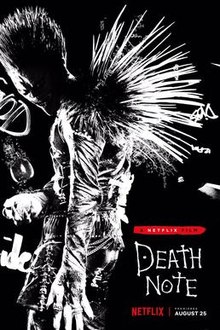
Death Note Review: Perspective of a Series Fan
Director: Adam Wingard
Writer: Charles Parlapanides, Vlas Parlapanides, Jeremy Slater
Starring: Nat Wolff, Lakeith Stanfield, Margaret Qualley, Willem Dafoe
Review by Josh Canales
 We’ve seen Death Note in various forms of media since its creation. The classic manga, the anime, a four movie live-action series, and even very recently a live-action mini-series that ties into the movies. This time around, Netflix is trying their hand at making the next adaption of this popular series.
We’ve seen Death Note in various forms of media since its creation. The classic manga, the anime, a four movie live-action series, and even very recently a live-action mini-series that ties into the movies. This time around, Netflix is trying their hand at making the next adaption of this popular series.
This version of Death Note is about Light Turner (Nat Wolff) and his girlfriend, Mia Sutton (Margaret Qualley) as they use a powerful notebook of death. Light discovers the owner, a Shinigami named Ryuk (Willem Dafoe) uses the notebook to kill criminals in various ways. Their efforts to “cleanse the world” of evil do not go unnoticed as a detective who goes by the name of L (Lakeith Stanfield). He travels to Seattle to help the local police department, led by Light’s father, to stop the killings.
To my dismay, saying that the Netflix adaption of Death Note is suffering from an identity crisis is to put it lightly. In an attempt to not make just another re-telling of the same story but also to stay close to the source material, Wingard creates a jarring effect that jerks you from the movie. At certain points, you have to wonder if he’d have been better off just doing something completely new with the story. It’s similar to what was done with Death Note: Light Up the New World.
Focusing on the physical horrors involved with the killing notebook, rather than the deep psychological themes and complex characters from the manga, Death Note turns into your basic B-rate horror movie. The film dumbs down everything that helped make the series interesting and exciting. For example, Light’s meticulous and emotionless planning for his murders. Instead, we get to see Light make obvious mistakes over and over again, many fueled by emotions.
The relationship between Light and L is really where the movie falls apart. Wingard seemed to want a cat-and-mouse type relationship between them, yet didn’t show it. ‘Forcibly implied’ would be an accurate way to describe the (not so) complicated relationship. Any of the mystery brought in is revealed or out-shined in the next scene or two, not allowing for any time for tension or excitement to build.
The characters in Death Note suffer from lack of development and interesting dialog. The lines delivered throughout the film feel unenthusiastic and unconvincing more often than not, as if in a rush. The conversations between characters necessary for growth and understanding just weren’t there. The dialog that was the driving force of the manga is simply not there in this adaptation.

Now, the movie isn’t entirely bad. There are many enjoyable aspects throughout the film. The characters Ryuk, Watari, and even Light’s dad were some of the highlights of the film. That said, Ryuk is shamefully underused after a great first appearance. He is hardly on screen at all, and when he is, he is usually mostly just shadow.
There are even multiple scenes throughout that had me letting out a good laugh. Not because the scene was meant to be funny, but more-so out of secondhand embarrassment. The awkwardness of Light in scenes like Ryuk’s introduction is hard not to at least laugh at a little bit.
Light’s character is entirely different from his manga namesake. Nothing makes this more blatantly clear than that of his relationship with Mia. Not only does he trust her way quicker than any logical person would, but he also seems to be somewhat driven by her. Their relationship is somewhat disturbing in a way that would’ve worked, only if we got to see it develop.
Death Note has a lot of underlying potential that just gets buried under unnecessary and tedious cliches. From the misunderstood and troubled cheerleader, to the workaholic absentee father, to the winter formal finale; everywhere you look there is another one.
Overall, Wingard clearly wanted to make something different and succeeded. In his attempt to do that while sticking to the source material, he created a mess that leaves the viewers un-entertained. When changing the race, last names, and locations of a story, there needs to be a solid reason for it; especially when it is taking minorities and replacing them with white people. These changes were entirely unnecessary for the story Wingard is telling. In fact, they felt really weird at times; such as the fact that they try to make the white actors look similar to their manga counterparts. The story that Wingard wanted to tell would’ve been more interesting as its own story, rather than an uncomfortable mash-up with the original.
The Verdict
Skip it. Netflix’s Death Note could’ve been a really interesting take on the notebook of death, but instead, it’s unsure of what it wants to be. I am not entirely sure what audience this movie is directed towards. I can assure you it is not for fans of the previous Death Note iterations. You can save yourself the time and watch the originals on Hulu instead.
For second thoughts, see non-series fan Michael Walls-Kelly’s review of Death Note.


![[REVIEW] FALL OF THE HOUSE OF X: WEEK THREE](https://geekd-out.com/wp-content/uploads/2024/01/xmen-30-2024-feat-150x150.jpg)

One thought on “Death Note 2017 Review: Perspective of a Series Fan”